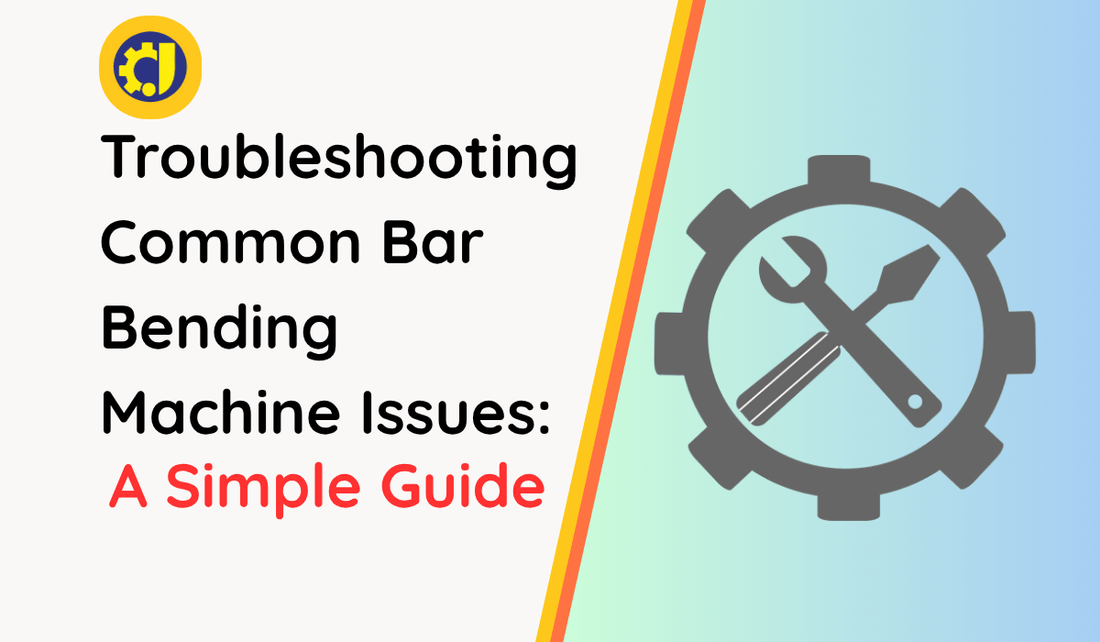
Troubleshooting Common Bar Bending Machine Issues: A Simple Guide
Troubleshooting Common Bar Bending Machine Issues: A Simple Guide
A bar bending machine is essential in any construction project where steel reinforcement is needed. It bends steel bars with precision, saving time and labor. However, like all machines, it can face occasional problems.
Fortunately, most issues can be identified and solved easily. In this guide, we’ll walk through the most common problems, how to fix them, and how to keep your machine in good shape.
1. Machine Won’t Start
Check Power Supply First
One of the most frequent problems is a machine that won’t start. This can happen due to a power failure, a loose cable, or a blown fuse.
Inspect Emergency Stop
It’s also possible that the emergency stop button has been pressed. Check all switches and wiring before moving to more serious concerns.
2. Inaccurate Bending Angles
Incorrect Angle Settings
If the bent bars are not matching your desired angles, the settings might be wrong. Double-check the angle dial or Pin insertion before starting.
Worn-Out Limit Switches
Another reason for wrong bends could be worn limit switches. These sensors guide the machine’s arm, and when they wear out, accuracy drops.
3. Strange Noises During Operation
Loose or Dry Moving Parts
Unusual noise is often a warning sign. Loose bolts, dry bearings, or worn gears can cause it. Pause the machine and inspect all parts.
Apply Lubrication
A quick fix might be to clean and lubricate moving joints. If gears are worn, they should be replaced immediately.
4. Machine Rotates Continuously
Limit switches are damaged
If the bending machine doesn’t stop at set angle, it could be due to Loose Limit switches or damaged Limit switches.
Check Limit Switch Condition
Sometimes, the issue lies in the Limit switch arm, if arm is loose tight the arm at required position. If arm is OK check Wiring for loose connection. If all is good then change the Limit switch.

5. Steel Bars Get Stuck
Wrong Bar Size or Dirty Rollers
Bars that jam or don’t feed properly can delay your work. Most often, this is caused by using bars that exceed the machine’s capacity or clogged rollers.
Clean Rollers Regularly
Clean the rollers and guide path after every shift to prevent blockages.
6. Machine Overheats During Long Jobs
Poor Ventilation
If your bar bending machine overheats, place it in a well-ventilated area. Poor airflow can lead to overheating, especially during long tasks.
Take Regular Breaks
Also, give the machine short breaks during long use. This reduces motor stress and prevents system failure.
7. Error Codes on Control Panel
Check the Manual
Newer machines show error codes when something is wrong. These codes help locate the issue quickly.
Restart After Fix
After fixing the issue (like a blocked sensor or motor overload), restart the machine. Always refer to the user manual for accurate code meanings.
8. Gear Oil Leaks
Inspect Seals and Hoses
Oil leaks are a serious concern. If you spot oil beneath the machine, check the hose connections and seals for cracks or damage.
Use the Right Oil
Also, make sure you’re using the right type of gear oil. The wrong oil can cause damage over time. If the oil seal is damaged, change the oil seal.
9. Control Buttons Not Responding
Dust or Moisture Issues
If the buttons stop working, it could be due to dust, dirt, or moisture inside the panel.
Clean or Replace
Try cleaning the panel gently with a dry cloth. If that doesn’t help, internal wiring may be damaged and a technician should inspect it.
10. Preventive Maintenance Tips
Simple Daily and Weekly Tasks
Fixing issues is great—but preventing them is better. Here are a few maintenance steps that can save time and money:
- Wipe the machine clean after every use
- Oil moving parts at least once a week
- Check wiring and switches monthly
- Replace worn parts before they break
- Keep the control panel dry and covered
Set a Maintenance Schedule
Set reminders or a checklist for your crew to ensure these tasks are done regularly.
Final Thoughts
A bar bending machine is an investment. To get the most from it, you must watch for signs of trouble early on. Thankfully, most common problems are simple to spot and fix.
By following these troubleshooting tips, you can avoid downtime, reduce repair costs, and keep your projects on track.
To sum up, perform regular checks, use the machine correctly, and don’t ignore small issues. That way, your machine stays safe, fast, and reliable for every job.
